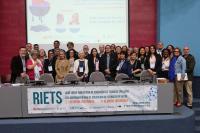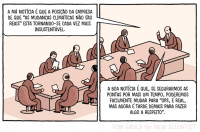Find out about the RETS-SIM initiative and the Rio de Janeiro Declaration


 The inspiration for working with the theme of simulation in the context of training health technicians came at the beginning of 2023, during the period of organizing and publicizing the International Congress of the National Clinical Simulation Network of Argentina (ReNaSic), which took place in August.
The inspiration for working with the theme of simulation in the context of training health technicians came at the beginning of 2023, during the period of organizing and publicizing the International Congress of the National Clinical Simulation Network of Argentina (ReNaSic), which took place in August.
During this period, the subject of simulation began to be the object of conversations at the Joaquim Venâncio Polytechnic Health School (EPSJV), of the Oswaldo Cruz Foundation (Fiocruz), where the Executive Secretariat of the International Network for the Education of Health Technicians (RETS) and its sub-networks is located. At the time, the main question was: what could be done to arouse the interest of the health technician training institutions that are part of the networks in simulation-based education in the training of these workers?
The oportunity
 On June 29, a the Ibero-American General Secretariat (Segib) launched, with the support of the Spanish Agency for International Development Cooperation (Aecid), a call for projects from the networks registered in its Network Registry. The purpose of the call was to strengthen Ibero-American cooperation and link the networks more effectively with the institutional space created in 2003 to support the 22 countries that make up the community: 19 in Spanish- and Portuguese-speaking Latin America and Spain, Portugal and Andorra on the Iberian Peninsula.
On June 29, a the Ibero-American General Secretariat (Segib) launched, with the support of the Spanish Agency for International Development Cooperation (Aecid), a call for projects from the networks registered in its Network Registry. The purpose of the call was to strengthen Ibero-American cooperation and link the networks more effectively with the institutional space created in 2003 to support the 22 countries that make up the community: 19 in Spanish- and Portuguese-speaking Latin America and Spain, Portugal and Andorra on the Iberian Peninsula.
Given this opportunity, the Executive Secretariat of the Ibero-American Network for the Education of Health Technicians (RIETS), one of the RETS sub-networks, presented the project “Development of Simulation Projects and Laboratories in the Education of Health Technicians in the Ibero-American Context”, which planned to carry out activities aimed at expanding knowledge of clinical simulation as a teaching-learning strategy and discussing its introduction in health technician training institutions.
Towards 2023: the international seminar, the expert workshop and the Rio de Janeiro Declaration
 The International Seminar 'Clinical Simulation in the Training of Health Technicians in the Ibero-American Context: Challenges and Perspectives’ and a workshop, held on December 4 and 5, 2023 respectively, were the initial milestone for the creation of the RETS-SIM Initiative within RIETS and, consequently, RETS.
The International Seminar 'Clinical Simulation in the Training of Health Technicians in the Ibero-American Context: Challenges and Perspectives’ and a workshop, held on December 4 and 5, 2023 respectively, were the initial milestone for the creation of the RETS-SIM Initiative within RIETS and, consequently, RETS.
At the seminar, professors and researchers from Argentina, Bolivia, Brazil, Chile, Colombia, Spain, Portugal and Uruguay presented various concepts and practices that make up the universe of simulation-based education, providing an overview of the topic.
The workshop discussed the main strategies - in terms of teaching, research, institutional coordination and cooperation - to advance the implementation of clinical simulation programs in health technician training institutions in the Ibero-American context.
 At the end of the workshop, the representatives of the participating institutions signed the Rio de Janeiro Declaration on simulation-based education in the training of health technicians, which proposes an agenda of initiatives. The document registers the progress achieved by consensus during the seminar, such as the concept that simulation as a learning strategy needs to be present not only in clinical activities, but also in laboratories; and to incorporate interculturality, traditional knowledge and the establishment of methodologies that can be reproduced in different environments. It also points to a future in which all health technician training institutions can incorporate simulation-based education into their courses.
At the end of the workshop, the representatives of the participating institutions signed the Rio de Janeiro Declaration on simulation-based education in the training of health technicians, which proposes an agenda of initiatives. The document registers the progress achieved by consensus during the seminar, such as the concept that simulation as a learning strategy needs to be present not only in clinical activities, but also in laboratories; and to incorporate interculturality, traditional knowledge and the establishment of methodologies that can be reproduced in different environments. It also points to a future in which all health technician training institutions can incorporate simulation-based education into their courses.
In this sense, the aim of RETS-SIM is to bring together groups of experts who are involved in simulation-based education issues - societies, federations, associations and networks, among others -; health technician training institutions that wish to work with this issue - public or in the public interest -, international organizations that can support actions and projects in this area; and government bodies responsible for policies in the areas of health and education.
About simulation-based education
Over the last few decades, clinical simulation has become an integral pedagogical strategy in health science teaching institutions in various countries, bringing together resources, opportunities and knowledge among all its members. Its adoption as a teaching methodology provides training in basic and simple skills (cognitive, affective and psychomotor abilities mobilized in a given context to carry out tasks) to more complex ones, involving organizational and behavioural aspects (teamwork, global activity or a set of acts by an individual in a situation), which allows learners to act in a protected and safe environment, with the possibility of repeating a task countless times and the opportunity for everyone to practice equally.
Simulated clinical experience provides greater support for clinical learning, offering different situations with varying complexities, according to the learning objectives and stage of the student's training.
Recognition of the importance of simulation-based teaching in universities and educational institutions has resulted in more courses being offered, more meetings and congresses in the area and the creation of associations and networks linked to the subject. Even so, there is a need for greater coordination and investment in public institutions to strengthen this practice and set up laboratories and simulation centers aimed at training health technicians.
2024: The International Meeting

In 2024, a new call for proposals published by Segib, together with other resources provided by the Pan American Health Organization (PAHO/WHO), made it possible to hold the International Meeting on Simulation-Based Education, with the theme “Broadening the perspectives for training health technicians: clinical simulation”.
The event was designed so that experts in the field of simulation; students, teachers and managers of training institutions; health technicians from different areas and levels of training; and health cooperation and regional integration organizations can exchange experiences with each other and with their peers in more than ten countries
The meeting was organized by the Joaquim Venâncio Polytechnic Health School (EPSJV/Fiocruz), RIETS and RETS, with the support of Aecid, through Segib, and PAHO/WHO.
The event was organized in collaboration with Argentina's National Clinical Simulation Network (ReNaSic), the Latin American Federation for Clinical Simulation and Patient Safety (Flasic), the Chilean Society for Clinical Simulation and Patient Safety (Sochisim), the Spanish Society for Simulation and Patient Safety (Sessep), the Portuguese Society for Simulation Applied to Health Sciences (SPSim), the Colombian National Learning Service (Sena), the Bolivian National School of Health (ENS) and the University of the Republic of Uruguay (Udelar).
The aim of the event is that virtual immersion and free participation could broaden participation, eliminating geographical and social barriers and creating the opportunity to generate innovative ideas that will contribute to the education of health technicians in Ibero-America and other countries.
What's coming up?
An exclusive website will soon be launched for the RETS-SIM Initiative, where you will find information on events, publications, courses on the subject and much more. The idea is that the creation of this space can encourage discussion on the subject, help disseminate knowledge about simulation as a teaching strategy and help health technician training institutions benefit from this innovation in their training and qualification activities for these workers, who are so indispensable for building national health systems capable of meeting the needs of their populations.
How can you join RETS-SIM?
While the website is not online, if your institution is interested in joining RETS-SIM, you can send an e-mail to RETS (rets.epsjv@fiocruz) and talk to us. You can also subscribe to the RETS Bulletin (electronic and fortnightly) to receive up-to-date news.



